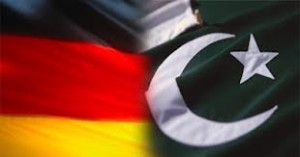Newspaper Article 11/11/2013
Pakistan and Germany are now celebrating the 52nd anniversary of their bilateral development cooperation. Both the states have a tradition of good and amicable relations. The Islamic Republic of Pakistan was one of the first countries with which Germany launched development cooperation back in 1961. Primarily, the cooperation is focused on renewable energies and energy efficiency, basic education and vocational training programmes, health and governance, etc. During the governmental negotiations on development cooperation that were conducted on September 6, 2013, Berlin has announced a new contribution of EUR 102.5 million, thus increasing the total contribution of German taxpayers towards Pakistan to more than EUR 2.5 billion. In this context, human capital has given Pakistan an enormous advantage. In a country where 60% of population mainly comprises of youth, chances for growth are comparatively high. On the other hand, Pakistan’s untapped natural resources and excellent geographical connectivity bring innovative opportunities of development. Thus, the power corridors in Islamabad need to focus on these areas of strengths that Pakistan can potentially offer to the world.
Against this backdrop, Berlin welcomes the granting of autonomous trade concessions to Pakistan by the European Union (EU). The EU constitutes an important aspect of bilateral relations. Germany has always supported the Pakistani efforts to get greater access to EU markets including the last year approved Pakistan-specific autonomous trade preferences. Germany would continue to be an advocate of Pakistan within the EU. Encouragingly, Germany has now become the largest trading partner of Pakistan in Europe and fifth biggest source of foreign investment in the country. Several German multinationals are running lucrative business in Pakistan for decades. In recent years trade and economy cooperation have become important factor in the deepening of Pakistan-Germany relations. German Federal Statistical Office shows that Pakistan’s exports to Germany increase by over 76% while bilateral trade volume increased by 2% during the past five years.
On the investment side, many German companies have identified business opportunities to Pakistan’s economy that it can offer to the foreign markets. Foreign Direct Investment (FDI) flows from Germany to Pakistan increased over past years, thereby making Berlin one of the major sources of foreign investment to Pakistan. The renewal of the Bilateral Investment Treaty in 2009 on completion of its 50 years and signing of the roadmap for strategic dialogue last year have paved the way for taking these relations more closer, thereby enhancing the multifaceted cooperation between the two countries in the coming days. Resultantly, bilateral trade between two countries fosters friendly relations and play a pivotal role in strengthening the bonds between business-to-business contacts. Trade relations are growing at a rapid pace. Pakistani business community is keen to increase trade with their German counterparts. Similarly the German companies are equally eager to explore our lucrative markets.
For more than 50 years, the German and the Pakistani Governments are cooperating for sustainable development in Pakistan. Commissioned by the German Federal Ministry for Economic Cooperation and Development (BMZ) and the German Federal Foreign Office (AA), the Deutsche Gesellschaft für Internationale Zusammenarbeit (GIZ) supports the Pakistani Government in the development and implementation of sustainable and effective solutions for political, economic and social transformation.
In this very regard, one of the most important reform areas is the re-introduction of beneficial framework conditions for the energy sector of Pakistan. German Development Cooperation is supporting to extend energy generation capacities especially through hydropower and is working closely with the public and the private sector towards increasing the efficient use of existing resources through extensive Energy Efficiency projects. Significant technical has been rendered by GIZ to public and private sector partners for the development and increase of renewable energy applications. Energy Management Systems were already introduced in four industrial sectors, namely textile, steel re-rolling, edible oil and steel foundries. So far the Energy Management Systems implemented lead to energy efficiency savings of almost 15 GWh, monetary savings of over 138 million PKR and avoidance of CO2 of 6,800 tonnes equivalent.
On side lines, Berlin appreciates Pakistan’s sacrifices in counter-terrorism and the constructive role that Islamabad has been playing in promoting peace and stability in Afghanistan. There is convergence of views on the need to accelerate the peace process in Afghanistan but on a whole German too wants tranquillity and stability in Afghanistan.
Indubitably, Pakistan-Germany relations have been built on solid foundations to withstand pressure of all kinds. Interestedly, Pakistan-Germany relations predate the former’s emergence on the world map. Berlin considers Islamabad as an essential partner and Pakistan’s contribution too will prove to be indispensible for the stability of the entire region. Moreover, the contemporary era is an opportune moment to rigorously work for the expansion of Pakistan-Germany strategic, trade and economic cooperation.
Muhammad Nawaz Khan is an Assistant Research Officer at Islamabad Policy Research Institute (IPRI) in Islamabad, Pakistan

